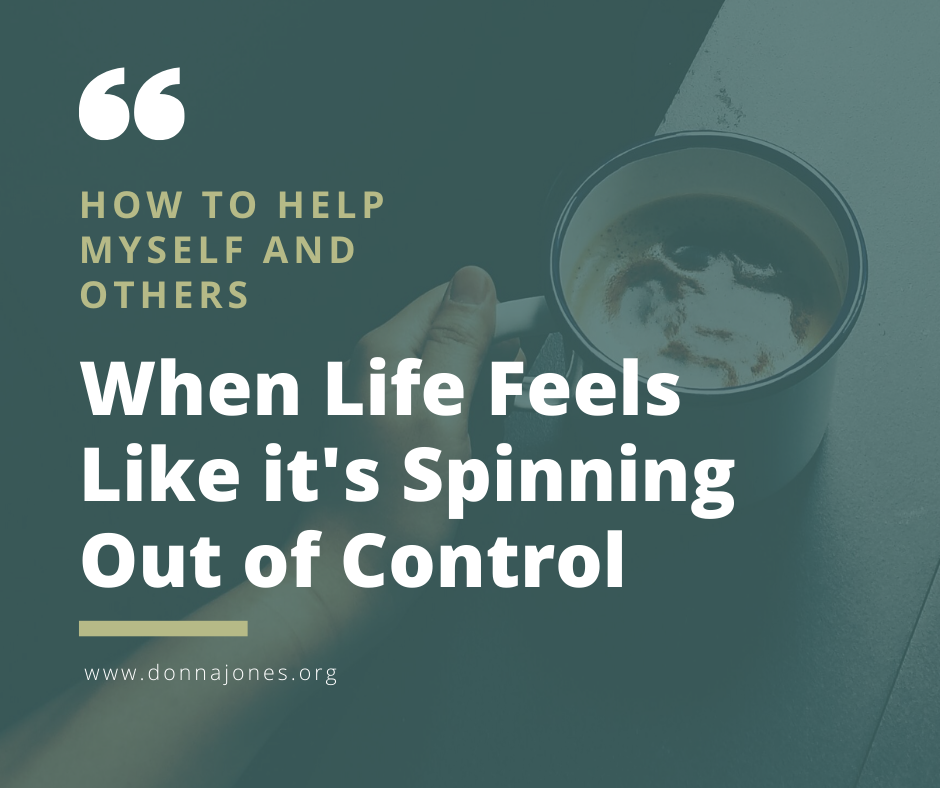I walked into Trader Joe’s just before 9am, in plenty of time to beat the crowds. Or so I thought.
Lines of people, with grocery carts heaped high, stretched from the cashiers to the back wall. Shelves were bare and, in some cases, empty. There was not one item in the frozen food section. Not one. And forget about toilet paper or antibacterial anything. Those were gone days ago.
It was the same at my local grocery store. And Costco.
I’m guessing your experience recently mirrors mine.
When life spins out of control–like it has in our world the past few weeks–we can choose one of two responses:
Live in the land of “What If?”
OR
Live in the land of “What Is”.
These two alternative ways of thinking and living aren’t just for moments of national emergency, they are also for moments of personal stress, anxiety and confusion, like the ones we face everyday.
What I’m about to share will help us and those we love now, but the principles apply to any situation where life feels like it’s spinning out of control.
How Can We Tell if We Are Living in the Land of “What If?”?
When we dwell on “what if?” our heart, mind and emotions easily become overwhelmed with unnecessary fear; our heart beats a little quicker, our mind spins a little faster, our emotions feel a little crazier.
For some, this fear manifests in paralyzing panic. For others, fear manifests in the need to over-control. And for a few, fear leads to denial or avoidance. We all have our own way of dealing with “what if?” living.
Of course, none of these responses is helpful. Or healthy. We certainly can’t help our kids, co-workers or loved ones navigate their emotions if we can’t rein in our own.
What makes “what if?” thinking even more insidious is that behaviors born out of “what if?” can be identical to those of “what is”.
Case in point: Two woman stock up on groceries. The “what if?” woman does so out of worry; the “what is” woman does so out of wisdom.
Shortly after my eye-opening Trader Joe’s experience, I fell prey to “what if?”living in (of all places!) the parking lot of Target. I found myself walking more quickly than usual just to get through the door. My elevated heart rate and rapid foot steps were indicators that somewhere in the back of my mind I thought, What if others beat me to the hand sanitizer? Or canned food? Or…heaven forbid….COFFEE??!!
Of course, seeing my thoughts described in text on a screen makes the craziness of “what if?” living seem ridiculous.
But “what if?” living doesn’t usually find its way onto a blog; usually “what if?” living plays out on the screen of our actions and emotions, making the subtly of its presence much harder to detect, but the toxicity of its presence every bit as unhealthy.
But there is an alternative.
It’s called living in the land of “What Is”.
When we focus on “what is” we’re free to plan, prepare, and pray based on accurate information, not anxiety-driven emotion. Wise plans, reasoned preparation, and sincere prayer lead to faith and confidence, rather than fear and insecurity.
Best of all, when we move from “what if?” to “what is” we can clearly assess “what now?”
This crucial shift in thinking puts us in position to help our kids, our neighbors, and our community navigate frightening situations with poise and confidence.
The apostle Paul knew the importance of living in the land of “What IS”. He wrote, “Whatever is true…. think about these things”. (Phil 4:8)
Just in case you aren’t sure if you’ve been a victim of “what if?” living, check out these differences:
- “What If?” means I obsess about the future, which I can’t know, and therefore, can’t control, so I feel insecure.
- “What Is” means I live in the present, which I can control, so I feel settled and secure.
- “What If” means I miss the joys of today because I am focused on potential problems of tomorrow.
- “What Is” means I embrace the joy of today, which gives me strength to face the hardship, as well.
- “What If” means I live in possibilities.
- “What Is” means I live in realities.
So how do we move from living in “what if? to “what is”?
-
Look Up
God has much to say about what is true, especially in uncertain circumstances. His Word is a compass for our wandering heart, mind and emotions.
The simple act of reading God’s love letter–The Bible–can comfort like nothing else. To help us look up, I’ve provided several encouraging Bible passages at the end of this post.
God also instructs His people to pray rather than allow ourselves to be overcome with anxiety.
Here are a few ideas for prayer:
- Pray God thwarts the spread of COVID-19, and that it is obvious a work of God, so He gets the glory!
- Pray Christians don’t shrink back in fear, but reach out in love.
- Pray for our leaders and our health-care workers.
- Thank God (yes, you read that right) that in every situation He remains faithful, sovereign and works all things according to His good purposes.
- Pray God uses this worldwide crisis as a catalyst for worldwide revival.
-
Look Out
Once we look up, it’s time to look out.
Look out for those who are in fear, those who need tangible help, those who need a friend—or maybe even a roll of toilet paper!
Does your elderly neighbor need someone to run an errand? Do it. Does a friend with special health concerns need an extra helping hand? Offer one. What about the guy or gal who depends tips?
This is a time to put faith and love in action!
Just yesterday I walked down the street to make sure my elderly neighbor had my cell phone number so she can call when she needs groceries, and was encouraged to learn a number of other neighbors (including my husband!) had done the same.
When we put the pause on our own “what if?” worry we’re free to see the “what is” ways we can help others.
So, how can I help myself and others navigate life when things spin out of control?
Stop living in the land of “What If?” and start living in the land of “What Is”, which will help answer the question “What Now?”
And when “what if?” threatens to disrupt our peace (and it will!), let’s make the choice to look up and look out.
God is for us.
God is with us.
God is in us.
This is the truth of “What IS.”
7 Scriptures to Help Us LOOK UP
- Fear not for I am with you; do not be dismayed for I am your God. (Isaiah 41:10)
- “And everything I’ve taught you is so that the peace which is in me will be in you and will give you great confidence as you rest in me. For in this unbelieving world you will experience trouble and sorrows, but you must be courageous, for I have conquered the world.” -Jesus (John 17:32b, 33)
- “I leave the gift of peace with you – my peace. Not the kind of fragile peace given by the world, but my perfect peace. Don’t yield to fear or be troubled in your hearts – instead be courageous!” -Jesus (John 14:27)
- “Rejoice in the Lord always. I will say it again: Rejoice! 5 Let your gentleness be evident to all. The Lord is near. 6 Do not be anxious about anything, but in every situation, by prayer and petition, with thanksgiving, present your requests to God.7 And the peace of God, which transcends all understanding, will guard your hearts and your minds in Christ Jesus.8 Finally, brothers and sisters, whatever is true, whatever is noble, whatever is right, whatever is pure, whatever is lovely, whatever is admirable—if anything is excellent or praiseworthy—think about such things. 9 Whatever you have learned or received or heard from me, or seen in me—put it into practice. And the God of peace will be with you.” -The Apostle Paul (Philippians 4:4-9)
- God is our refuge and strength, an ever-present help in trouble. 2 Therefore we will not fear, though the earth give way and the mountains fall into the heart of the sea,3 though its waters roar and foam and the mountains quake with their surging.10 He says, “Be still, and know that I am God; I will be exalted among the nations, I will be exalted in the earth.”11 The Lord Almighty is with us; the God of Jacob is our fortress. (Psalm 46:1-3;10-11)
- “So do not worry, saying, ‘What shall we eat?’ or ‘What shall we drink?’ or ‘What shall we wear?’ 32 For the pagans run after all these things, and your heavenly Father knows that you need them. 33 But seek first his kingdom and his righteousness, and all these things will be given to you as well. 34 Therefore do not worry about tomorrow, for tomorrow will worry about itself. Each day has enough trouble of its own.” – Jesus (Matthew 6:31-34)
- “Be strong and courageous. Do not be afraid or terrified because of them, for the Lord your God goes with you; he will never leave you nor forsake you.” -Moses (Deuteronomy 31:6)
Did you know you can follow Donna on Instagram at @donnaajones? She’d love to connect with you there!


